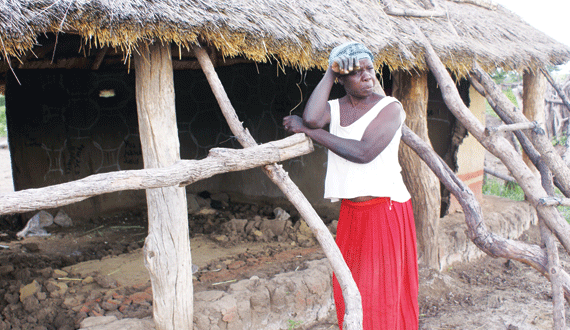
AFTER years of consecutive droughts, Save Sibanda of Mapili village in Tsholotsho North under MP Roseline Nkomo, had high hopes of a good harvest from the onset of the rainy season as the rains fell daily in the drought-prone district.
NQOBANI NDLOVU STAFF REPORTER
The 55-year-old widow believed that a good harvest would see her family of five dependent children through to the next farming season.
“I thought the rains were bringing happiness and bringing an end to a year of poverty and hunger. It’s depressing that this is not going to be the case,” Sibanda said.
Army worms invaded her fields and destroyed crops leaving her family facing starvation last year because she did not have money to buy Garbarly chemicals to kill the notorious caterpillars.
Sibanda said they could only watch in agony as the armyworm destroyed her crops.
About 55 grams of the chemical costs $8 in the city.
Experts have indicated that lack of money and knowledge on forecasting and management of the armyworm had resulted in subsistence farmers losing their crops to the caterpillars.
- Chamisa under fire over US$120K donation
- Mavhunga puts DeMbare into Chibuku quarterfinals
- Pension funds bet on Cabora Bassa oilfields
- Councils defy govt fire tender directive
Keep Reading
“All my planted crops were destroyed by the armyworms. I had no money to travel to Bulawayo to buy the chemicals needed to spray the caterpillars,” Sibanda said.
“We managed to survive on food hand-outs and begging for the whole year. My first born son would also buy us mealie-meal as and when he got piece jobs in the community,” she added.
“After that horror, all I could hope for in the 2013-2014 farming season was not a repeat of what we went through. And I was just like other villagers very happy when the rains came in late December as it brightened the prospect of a good harvest.”
However, despair seems to have set in as the rains pounded her village non-stop in January.
The torrential rains destroyed planted crops, leaving her facing another year of begging for food handouts.
As the rain’s intensity increased, her homestead was flooded and some of her huts collapsed while some chickens were swept away. Her homestead had three huts – a kitchen and two bedrooms.
To add to her woes, the bedroom hut that she now shares with three of her daughters has huge cracks and “I am scared it will collapse if we face those heavy rains again anytime soon.”
When a Southern Eye crew visited Mapili on Tuesday, Sibanda told us she felt she was cursed.
“Why me? Why do I have to suffer like this? Where do I get the food? Why should my life be one of begging for food?”
Sibanda said what particularly pained her was that she had struggled to get the maize seed and indicated that if she had known that it would go to waste: “I would have sold it and bought myself a nice dress.”
Sibanda is not alone in this predicament as a number of people in her village have also lost crops, homesteads and some livestock to the floods.
Almost a month after the floods, the villagers are still waiting for assistance from the government and other donors.










